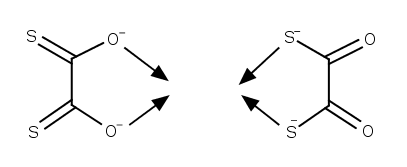When a ligand has multiple donor sites, but uses only say $x$ of them at a particular time, then it's called ambidentambidentateate ligand. However, if it uses different number of sites in different compounds (say $x$ in one and $y$ in the other where $x\ne y$), then flexidentate is a more appropriate term as said in the other answer. But this doesn't mean all ambidentate ligands are monodentate.
For example, dithiooxalate is bidentate and ambidentate:
This example is from the book Concise Inorganic Chemistry by J.D. Lee (Adapted by Sudarsan Guha).

